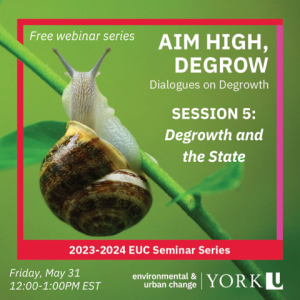The Joint Conference of ISEE, ESEE, and DEGROWTH
in collaboration with Manchester University, UK
Building Alternative Livelihoods in times of ecological and political crisis
Given the continuing pandemic, the joint conference between the International Degrowth Research Network, the International Society for Ecological Economics, and the European Society for Ecological Economics will now be a virtual conference. It will be hosted 5-8 July in Manchester, UK. This conference will build on the experience of the joint colloquium of September 2020 to bring together academics from the Degrowth and Ecological Economics communities, voices from the Global North and Global South, civil society actors, activists, artists, and policy-makers. It aims to stimulate dialogue between and within different perspectives, disciplines, and social movements.
Building Alternative Livelihoods in times of political and ecological crisis will remain the overarching theme of the conference. Details from the first call are outlined below. All papers and sub-themes proposals already submitted will be considered for the conference. If you have submitted a proposal and wish to keep the proposal in the system then it will be considered as it is. You are also welcome to revise your submissions. Full details on how to proceed will be circulated in the coming weeks.
Given the significance of the pandemic for the themes of the conference, we are also adding an additional subtheme:
Economy and livelihoods after Covid-19: The Covid-19 pandemic and responses to it have had deeply unequal impacts on lives, livelihoods, and well-being across race, gender, and class. At the same time, it has opened up the space for new possibilities for building alternative livelihoods and economies that can take us beyond a capitalist economy that requires ever-expanding growth. This is an additional call for papers that look more specifically at the implications of the Covid 19 pandemic both for the forms of inequality that exist within current society and for the possibilities for building and rebuilding alternative livelihoods. Existing contributors to the conference are also welcome to revise their papers in the light of the pandemic if they would like to do so.
Previous call:
Building Alternative Livelihoods in times of political and ecological crisis is the overarching theme of the conference. Economic systems have always co-evolved with social, environmental, and technological systems. The worsening ecological and climate crisis means we must urgently abandon practices of production and consumption associated with ecological degradation and rely on unsustainable extractivism. We must develop alternative livelihoods that are harmonious with planetary limits and safeguard material living conditions. We must invent and trial new ways of working, providing for everyone’s needs, caring for each other, and democratising the economy. We must seek clarity about the systems of provisioning which will be utilised in a society beyond growth where states and markets play more peripheral roles in the allocation of resources. In short, we must ask what are the alternative livelihoods which ensure the future conditions of societal wellbeing.
The construction of alternative livelihoods entails a radical transformation of economy, culture, and society. What are the institutional arrangements which safely provide for basic needs, social stability, and democratic legitimacy in the transition to environmental sustainability? How can both social justice and ecological justice for the populations of the Global North and the Global South be ensured? How can political support be mobilised for the necessary transformations? How can the transition to environmental sustainability be made politically viable and democratically legitimate?
We list below some of the topics that the conference could cover. We also look forward to ideas beyond these, which would expand the geographical and thematic scope of degrowth, as well as advance and further substantiate current degrowth debates.
- the economy beyond states and markets
- the future of employment, work, and care
- debates on degrowth, green growth, the circular economy, and decoupling
- forms of decommodification and non-capitalist modes of resource allocation
- the democratisation of the economy and alternative models and forms of organisation
- the production and conservation of energy
- low carbon and low energy futures
- commoning resources
- money, debt and the financial system
- monetary and non-monetary measures of prosperity and well-being
- a universal basic income or universal basic services
- the green new deal and degrowth
- the decentralisation of power
- decolonization and feminist economics as challenges to power
- post- growth policy-making, law, and governance
- how to respond to the ethno-nationalist environmentalism and anti-environmentalism of ascendant populist groups
- the politics of transitions to sustainability and the lessons to be learned from past socio-economic and cultural transformation
- spatial issues: planning, housing and the future of cities
- diversity and degrowth: class, race, gender, abilities
- Sustainable Development Goals and Degrowth
- conflict resolution processes and socio-ecological transformations
- biodiversity, ecosystem services, and sustainable livelihoods
- degrowth and social metabolism
- political economy and ecological economics/degrowth
- sustainable livelihoods and ecological sufficiency
- languages of valuation and ecological conflicts
- extractivism, Environmental Justice, and illicit activities
- social-ecological economics and degrowth
- production, consumption, and degrowth
- strategies for degrowth transformation: lessons from the Vienna conference



One Response
I can see that in physical terms, it is to be prefered to cluster conferences together (and travel less) but I don’t understand why all conferences need to become one in a virtual setting. The list of topics becomes extremely long, making it harder to build a community (unless you aim to exclude ecological economists that are not working on degrowth). Learning from recent conferences, the virtual versions are much nicer in a smaller, more focused setting, sometimes as afternoon sessions spread over multiple weeks, or perpetual on a fixed day (eg IEC). Perhaps one could split up days/themes between ESEE, ISEE and degrowth (and perhaps one joint day)?